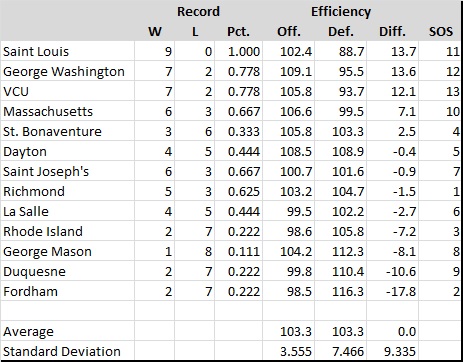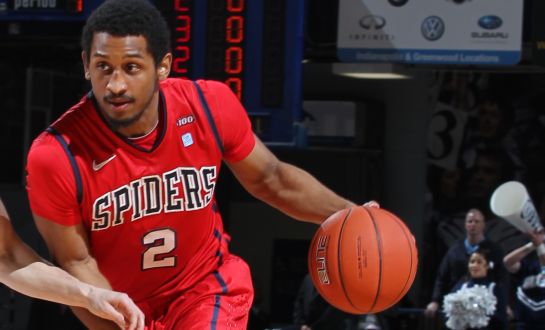Checking In On… the Atlantic 10
Posted by Joe Dzuback (@vtbnblog) on February 12th, 2014Joe Dzuback is the RTC correspondent for the Atlantic 10 Conference. You can also find his musings online at Villanova by the Numbers or on Twitter @vtbnblog.
Looking Behind the Conference Win-Loss Records
The conference win-loss record hints at the overall dimensions of the conference race. Possession-based statistics can provide insight on how any of the teams developed their current standing. The sample is small, anomalies and outliers abound — the conference records and efficiency differences will not “behave” for another two-to-three weeks (if then). By comparing the record, the difference between a team’s offensive and defensive efficiency (points scored per 100 possessions), and their difference (offense – defense), along with the conference strength of schedule, we can understand more precisely where a team stands with respect to the conference race, and their prospects going forward.
The top four (Saint Louis, George Washington, VCU and Massachusetts) and the bottom four (Rhode Island, George Mason, Duquesne and Fordham) are clearly separated from the “middle six”, forming three basic tiers. A paradox or two jump out quickly: Saint Joseph’s -2.7 efficiency difference contradicts the Hawks’ 6-3 conference record as does St. Bonaventure’s +2.5 difference with a 3-6 record. Coach Phil Martelli’s squad suffered through double digit routs (versus Richmond and Saint Louis), while all three of the Bonnies conference wins (Richmond, La Salle and Massachusetts) were by double digits. While Saint Louis, GWU, Massachusetts and VCU are relatively secure in the NCAA field of 68 with seeds ranging from Joe Lunardi’s bracket (#5 seed — Saint Louis to #9 seed George Washington, four bids total), to Jerry Palm’s bracket (#6 seed — Saint Louis to a first round play-in #12 — Richmond, five bids total), to RTC’s Daniel Evans’ bracket (#7 seed — Saint Louis and Massachusetts to #9 seed George Washington, four bids) the consensus is about four+ bids with the mostly upper bracket seeds. Palm’s fifth bid — a right side of the bubble play-in seed for Richmond — hints that the conference could garner more than four bids.
Although Dayton was an overwhelming favorite going into the conference season, the strongest candidates at this point appear to be 15-8 Richmond and 16-7 Saint Joseph’s. Sporting an RPI in the low 40’s (43) and a 6-8 record versus Top 100 teams, Richmond’s worst loss was to #90 St. Bonaventure in the first week of January. An absence of bad losses (to teams ranked lower than #100 in the RPI) is their strongest argument. Wins over #12 UMass and #44 Saint Joseph’s are the Spiders resume wins. Having the #1 SOS in conference play so far, the Spiders can compile a strong conference record if they can overcome the double loss of senior guard Cedrick Lindsay, who accounted for nearly 30% of their possessions and 28% of their shots when he was on the floor, and senior forward Derrick Williams who left the team for personal reasons last week. Lindsay suffered torn meniscus to both knees and will not return. The remaining schedule favored a full-strength Spider squad as they will face their toughest opponents, George Washington and Virginia Commonwealth, at home. Lacking Lindsay, a four-year contributor and three-year starter, in addition to Williams, could lower the Spiders’ win ceiling to four, putting their projected conference record at 9-7, and handing them a mediocre 5-5 “Last 10 games” record going into the conference tournament. With four games against opponents with RPI ranks greater than 150, priority one will be wise not to lose to Duquesne (#197), Fordham (#184), George Mason (#183) or Rhode Island (#145).
Saint Joseph’s, ranked #44 in the RPI, owns an uninspiring resume (3-6) that was helped immensely by a home win over Virginia Commonwealth last weekend. Unlike the Spiders, the Hawks have an ugly loss to #183 ranked Temple — those local rivalries can be killers. The road home will not be easy, as Martelli’s charges still have road games with George Washington, Big 5 rival La Salle and St. Bonaventure (Olean, NY in February is brutal) and home games with Dayton and La Salle.
Games To Catch This Week
Jockeying for an easier draw in Brooklyn takes a back seat to the games that will most likely eliminate at-large candidates this week.
- George Washington at Virginia Commonwealth (Wednesday February 12, 7:00 pm ET, NBC SportsNetwork) — Whether they have a full back court (as full as they can have with Kethan Savage out) or not, the Colonials will have a hill to climb at VCU. Joe McDonald has a 26.8% assist rate, just on the plus side of his 24.8% turnover rate. Shooting guard Maurice Creek’s assist-to-turnover ratio is under water. If McDonald is not available, Coach Mike Lonergan will hand the ball to freshman back up Miguel Cartagena…and hope. VCU scores most efficiently in transition, either from defensive rebounding and run-outs or from turnovers. Ram points from their half court offense are scarce, so keep track of GWU’s turnovers and VCU’s offensive rebounds, they will hint at how effective VCU’s offense will be that night. The Isaiah Armwood/Juvonte Reddic matchup should make for good viewing, as they are similar in build and skill. Armwood is the Colonials’ best defensive rebounder and has logged double-doubles in six of GWU’s last eight games, while Reddic is among the best in Division I for offensive rebounds.
- Saint Joseph’s at La Salle (Saturday February 15, 11:00 am ET, ESPNU) — Philadelphia’s two representatives to the conference have enjoyed a boomlet in the scramble to secure an NCAA bid. The Hawks’ win over VCU (and near miss versus Creighton in November) There will be no surprises, the game will come down to who wants it more and who has the better day. Pomeroy says La Salle by four (home court advantage, more or less), but this is a rivalry game, and a Big 5 one at that. The game will worth a watch whether the two were undefeated or winless.
- Virginia Commonwealth at Saint Louis (Saturday February 15, 1:00 pm CT, ESPN2) — With the loss at Saint Joseph’s last weekend the Rams fall two losses behind the conference-leading Billikens. This a must win if Coach Shaka Smart’s squad has any hope of winning/sharing the conference regular season title with Saint Louis. The road however has not been kind to VCU this season — every one of their five losses has come away from the Verizon Wireless Center (their on campus arena). VCU’s press and trap defense is less effective on the road and against veteran back courts that value the ball. Given their lackluster field goal conversion rate (46.3% eFG in conference play), offensive rebounding becomes critical for the Rams’ second chance opportunities. Saint Louis does cough up the ball at times, but they are tops in the conference at defensive rebounding and overall defense. Keep count of the Billikens’ turnovers and fouls on both teams’ front court players. Sending Juvonte Reddic, Dwayne Evans or Rob Loe to the bench will impact (for better or worse) VCU’s second chance opportunities. Should Coach Jim Crews’ squad hold serve, they will have a three loss cushion to ride through the balance of conference play and reduce the significance of their return date at VCU March 1.
- Massachusetts at George Washington (Saturday February 15, 2:00 pm ET, SNY/CSN Mass) — If the week goes according to seed, the winner will own second place with a half-game on the loser and VCU. Like GWU and VCU, Massachusetts has a stellar low post presence in senior Cady Lalanne; his matchup with Isaiah Armwood (and Kevin Larsen) should set up a rebounding battle as both are among the best in Division 1. The Minutemen would appear to be vulnerable to turnovers, but given Joe McDonald’s hip problems (and Savage’s broken foot), a patched-together back court could be the Colonial’s downfall. For Derek Kellogg’s crew, Raphiael Putney’s inconsistent point contributions and sporadic turnover woes continue in sharp contrast to his performance in the early season. Consistent scoring and turnovers (on offense) have become a problem for UMass. A run into the second weekend of the post season (indeed, an invitation to the post season) depends on solving those problems.











































